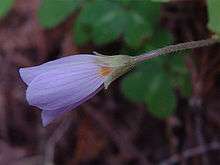Oxalis oregana
Oxalis oregana (redwood sorrel, Oregon oxalis) is a species of the wood sorrel family, Oxalidaceae, native to moist Douglas-fir and coast redwood forests of western North America from southwestern British Columbia, Washington, Oregon, and California.[1][2]
| Oxalis oregana | |
|---|---|
| Scientific classification | |
| Kingdom: | Plantae |
| Clade: | Tracheophytes |
| Clade: | Angiosperms |
| Clade: | Eudicots |
| Clade: | Rosids |
| Order: | Oxalidales |
| Family: | Oxalidaceae |
| Genus: | Oxalis |
| Species: | O. oregana |
| Binomial name | |
| Oxalis oregana | |
Description

Oxalis oregana is a short, herbaceous perennial plant with erect flowering stems 5–15 cm tall. The three leaflets are heart-shaped, 1–4.5 cm long with purplish undersides, on 5–20 cm stalks. The inflorescence is 2.4–4 cm in diameter, white to pink with five petals and sepals. The hairy five-chambered seed capsules are egg-shaped, 7–9 mm long; seeds are almond shaped.[3]
Light response
Redwood sorrel, Oxalis oregana, photosynthesizes at relatively low levels of ambient light (1/200th of full sunlight). When direct sunlight strikes the leaves they fold downwards; when shade returns, the leaves reopen. Taking only a few minutes, this movement is observable to the eye.[4][5]
Food
The leaves of Oxalis oregana were eaten by the Cowlitz, Quileute and Quinault peoples. Like spinach, they contain mildly toxic oxalic acid, which is named after the genus.[6]
References
- "WTU Herbarium Image Collection". Burke Museum. Retrieved 2016-05-02.
- "Plants Profile for Oxalis oregana (redwood-sorrel)". plants.usda.gov. Retrieved 2016-05-02.
- "Nyctinasty and Mimosa leaf movement". Science and Plants for Schools. Retrieved 2016-05-02.
- "Oxalis oregana". Electronic Atlas of the Plants of British Columbia. Retrieved 2016-05-02.
- "12.1.1 Light interception and utilisation". Plants in Action. Archived from the original on 2016-03-19. Retrieved 2016-05-02.
- Pojar, Jim; Andy MacKinnon (2004). Plants Of The Pacific Northwest Coast: Washington, Oregon, British Columbia & Alaska. Lone Pine Publishing. ISBN 978-1-55105-530-5.
| Wikimedia Commons has media related to Oxalis oregana. |